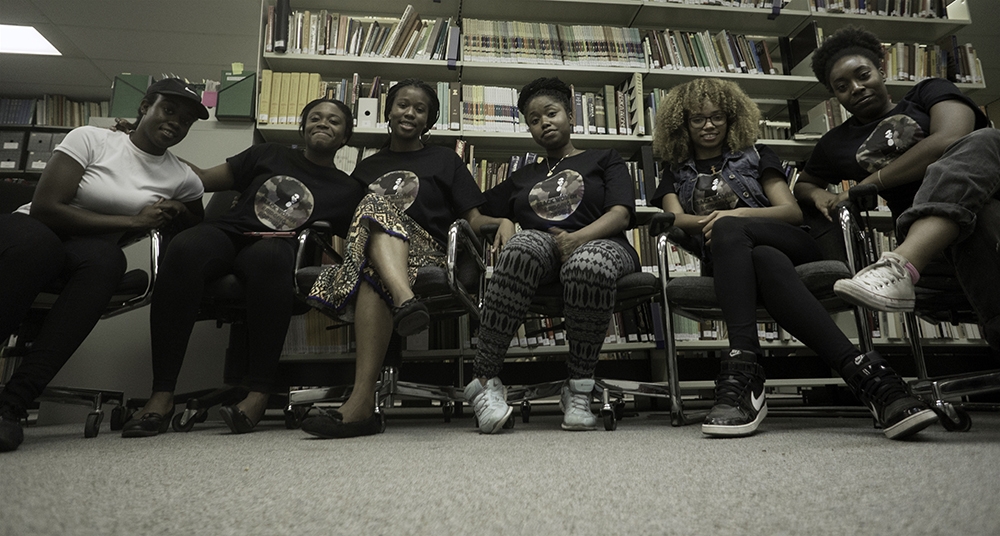Bernice Afriyie (Arts Editor) and Arfi Hagiyusuf (Featured Editor)
Featured image: BWBB, a new club on campus, found the space to build connections for black women. | Alexander DeSouza
Meet Black Women Bridging Borders. You probably haven’t heard of them yet, but BWBB is a club founded by fourth-year philosophy student Adlynn Louidor. The nonprofit organization aims to unify black women by showcasing their experiences as a collective, through performance, academia, advocacy and mentorship.
“Since economic difference is the main determinant producing variations in their lives, black feminists attack racism, sexism and poverty simultaneously,” said Ula Y. Taylor, a University of California, Berkeley professor whose specializations include black feminist theory. “The ultimate goal of black feminism is to create a political movement that […] struggles against exploitative capitalism,” and, we may add, also provides spatial visibility for black women. Through artwork and workshops held throughout the year, BWBB seeks to do just that, by working to improve the representation and growth of black women who experience racism and oppression on multiple fronts.
Louidor first got the idea for the club after a trip to Europe. She remembers seeing a line of black women prostituting themselves on a street in Nice, France. Upon her return to Toronto, Louidor wanted to create a space for black women in both the York and neighbouring communities to express themselves through creative channels. Louidor also attributes her motivation to a second scenario closer to home. “My little sister decided to relax her [hair] and sew on a ponytail because she felt like she wasn’t beautiful like her Barbie dolls,” she says.
BWBB is community-based and grassroots in nature—working on the ground to make changes to the positions of black women in society today.
“Getting women’s voices and fears on the urban agenda has been a difficult endeavour due in part to the continued rejection of women’s experiences in public spheres,” claimed feminist scholar Yardena Tankel. Part of this difficulty stems from a lack of faith in government institutions. It’s hard to put complete trust in government projects, education, law enforcement agencies and other social institutions when black women have experienced historic discrimination from them. BWBB tries to fill this gap.
“Black women are so beautiful [and] strong [and] go through a lot in society and don’t have a voice to express ourselves in ways that we feel comfortable,” adds Elle Robertson, vice president of BWBB. “This can be an opportunity to have an open space where everyone can be themselves and we can empower one another in society.”
Part of the club’s mandate is empowering black women and encouraging them to tell their stories, but also working with other associations on campus to foster education about black women and their issues. It’s important to build black women up, but also to build a better understanding of blackness outside of their communities.
“Black women have historically had a central place within the way that their communities are developed and understood,” noted Debbie Weekes in her analysis of the formation of black female communities. The formation of these communities is essential to the survival of black women, and demonstrates their strength and resilience in the face of adversity. BWBB pays homage to the historic necessity of bringing black women together, but also encourages black women to show other sides of their identity. It’s okay to be sad, happy, weak, angry and so on. No one emotion is more valid or authentic to black women than the other.
This speaks specifically to the stereotypical angry black woman often presented in the media. Though, as noted above, black women experience a range of emotions, which sometimes includes anger, the media’s tendency to hone in on anger as a feature of black women is nothing short of racist. It denies black women the right to tell their own stories by saying that there is nothing more to say about black women, aside from their anger.
As Marcyliena Morgan and Dionne Bennett said in “Getting Off of Black Women’s Backs:” “the ‘Angry Black Woman’ as cultural ideology rather than social or psychological reality [is] an ideology that serves to silence and dehumanize black women by blaming them for experiences of racist sexism that affect them in personal and political ways.”
BWBB’s goal is not to eliminate representations of strong or angry black women, but to diversify the image of black women in the media. That can only occur when such reproductions are reshaped to reflect all black women.
BWBB combats this by analyzing problematic macrocosms on a local level. “You can see […] many representations in media: Viola Davis, Lupita Nyongo, and the list goes on, but that will not reflect […] how black women are represented in the community. We also need [representation] here,” asserts Robertson. “Black women at a community level.”
Change can only occur if we focus in on the everyday black woman who must negotiate her self-worth based off of what the media and outsiders consider to be appropriate for her.
Along with bi-weekly meetings that members and non-members are encouraged to attend, Louidor and her executive team are excited to share many forthcoming events that celebrate black women in the arts. This Friday, September 30, the ladies are hosting Let’s Express, a night of spoken word at York. This will be the club’s first on-campus event and will act as a meet and greet, showcasing poetry from spoken word artists, both from York and from the neighbouring communities, on black women’s experiences.
The club also intends to start an on-campus mentorship program and hopes to build links and networks for black female students. In the future, we will see how BWBB incorporates agism, queer, trans, mental health and sexuality concerns into their club initiatives.


